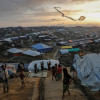Has our policy towards Myanmar failed?

There should have been a multilayered approach to the Rohingya issue from the beginning. Since there are varied interests in Myanmar of different stakeholders—the West, China, and India— when it comes to investment and economic prospects, there is naturally a conflict of interest. So, it is not wise to depend solely on any of those actors for a solution. This is why we needed to bring up the repatriation issue strongly in multilateral forums.
We can see that the problem with repatriation was created right at the beginning when we introduced the term FDMN (forcibly displaced Myanmar nationals) instead of using the term refugee. How did we come up with this term, and why? Had we used the term refugee, we could have cited the UN Refugee Convention, even if we are not a signatory. We are a signatory state to the Global Compact of Refugees, and it falls upon all signatories to resolve the refugee crisis. We could have brought it to the UN General Assembly in a different way; we could have mentioned the R2P (responsibility to protect) principle. A multilayered approach would have allowed us to offset the conflicting interests we are now having to navigate.
The countries we are looking to for solutions have economic interests in the region of Rakhine—such as the Kaladan Multi-Modal Transit Transport Project, Trilateral Highway Project, investment in Sittwe Port, and the oil and gas pipeline project. This is why we cannot really be certain whether they are serious about the Rohingya repatriation or if we are becoming pawns in their game.
Instead of saying whether our foreign policy failed, I would say that in order for it to be successful, particularly for the Rohingya repatriation, we needed to effectively create the intellectual and institutional space and capacity to pursue the issue. Instead, we made things worse by not using the term "refugee."
In the current context, one might argue that a window of opportunity has been created for repatriation. With the central authority in a major crisis, and the Arakan Army and the Northern Alliance needing international recognition, we are in a good bargaining place. It is likely that administrative control might go to the Arakan Army in the near future, which means we need to keep the door open. They said in an interview that the Arakan Army is ready to accept Rohingya Muslims as citizens, though they did not use the word Rohingya. Whether or not we will seize this opportunity will depend on whether our foreign ministry is able to exercise its autonomy, or is trapped in the interests of others. We are still solely dealing with the central authority, but now we need to maintain neutrality and create space with other groups.
When it comes to crisis management in foreign policy, there should be a consultation group with experts and independent thinkers to guide the foreign ministry, if we want to ensure our autonomy. The ministry should create a group of consultants who can brief it about the complex terrain in Myanmar and give suggestions. We must remember that in this current geopolitical climate, we need to strengthen our intellectual capacity as much as our intuitional capacity when it comes to diplomacy.
Dr Mohammad Tanzimuddin Khan is professor at the Department of International Relations in Dhaka University.
Views expressed in this article are the author's own.
Follow The Daily Star Opinion on Facebook for the latest opinions, commentaries and analyses by experts and professionals. To contribute your article or letter to The Daily Star Opinion, see our guidelines for submission.

 For all latest news, follow The Daily Star's Google News channel.
For all latest news, follow The Daily Star's Google News channel. 








Comments